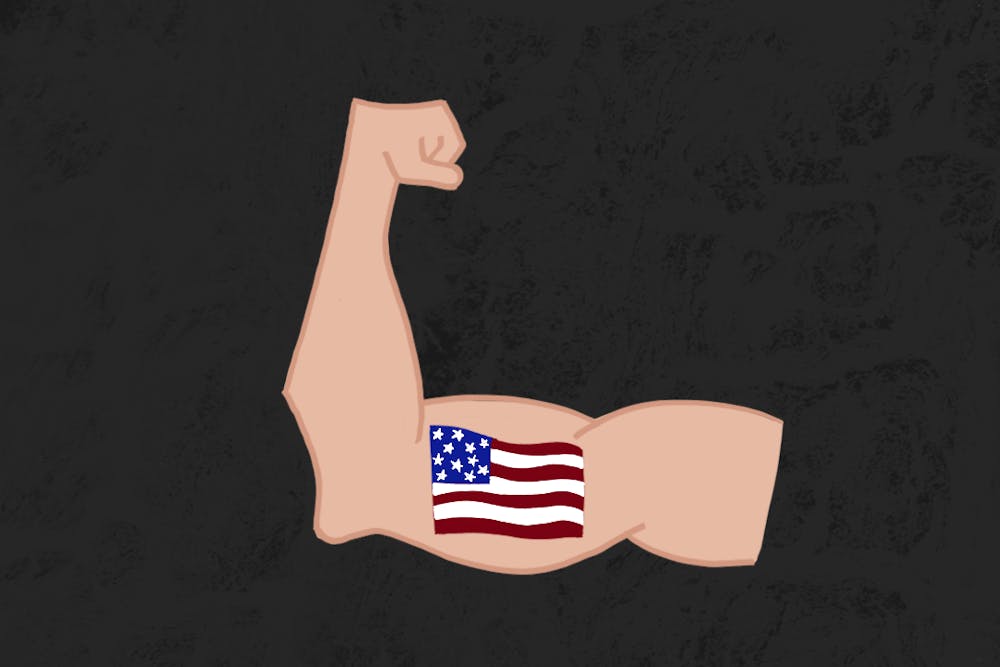Historically, voter turnout has been higher among women than men since the '80s, but with the rise of targeted ads and the projected close election race, both Democrats and Republicans have sought to change that.
Men accounted for about 44% of early votes cast so far in this election, according to TargetSmart.
Both parties have adjusted their campaign strategies to better reach out to men and the demographic's priorities in this election. This brings forward a complicated relationship between masculinity and politics.
Douglas Goodyear, who is on the Arizona Board of Regents, said the campaigns are now using strategies that are appealing to traditionally masculine traits.
"Harris has (campaigned) with her prosecutor's background to show that she was tough on crime,” Goodyear said. "Tough is certainly part of Trump's image as it relates to the border. So they're both trying to show that they can be tough and actually get the job done."
READ MORE: Women at ASU speak on voting disparities, the gender gap and the fight for women's votes
Craig Calhoun, a professor for the School of Politics and Global Studies, said because the election is so close this year, gaining votes from any demographic could make the difference.
ABC News' election analysis website, 538, reported in a poll that the difference between former President Donald Trump and Vice President Kamala Harris is near 1% as of Nov. 4.
Calhoun said parties themselves are now associating their campaigns with expressions of masculinity.
He said the supporters of the Trump-Vance campaign attempt to dramatize their following as "a part of their symbol of being masculine, being rebellious, being strong, being independent."
Steven Smith, a professor in the School of Politics and Global Studies, said that this can be due to the rhetoric of the Trump-Vance ticket, but the Harris-Walz campaign is attempting to contrast this strategy.
"It's (Trump's) attitude, it's that sentiment, probably more than the content of the policies advocated ... that may appeal to some men," Smith said. "We've seen, on the other hand, that the Harris campaign has tried to address this by pointing out that being a bully isn’t being truly manly."
Josh Laggis, a junior studying photography and a member of Sun Devils for Harris, said the Democratic party is trying to move away from more traditional values of masculinity. He said he has seen this with Gov. Tim Walz.
"If (Walz) can be on these big stages talking about these issues, maybe I can too," Laggis said. "I think his whole persona really makes men more comfortable."
Laggis said "This election specifically has shown male voters it's okay to show that you care about (political issues), and to advocate for them publicly," but he has also faced backlash for doing the same.
Laggis was the only male speaker at the Sun Devils for Harris event with America Ferrera in September, and received negative comments about it on social media from Republican friends who he said typically act "manly".
"I think it does affect how people perceive you ... on a man-to-man basis," Laggis said.
Afonso Machado, a freshman studying political science and a volunteer at Republican voter registration events on campus this semester, said he has also seen the harmful effects of identity politics in this election and is strongly against it.
"People prefer to just vote on a candidate because they don't like the other one, or because the media tells them that a candidate fits their group versus what that candidate represents in terms of policy and agenda," he said. "I think that's very dangerous for our country, and I think it needs to change at some point."
Edited by George Headley, Sophia Braccio, Tiya Talwar, Alysa Horton and Natalia Jarrett.
Reach the reporter at pkfung@asu.edu and follow @FungPippa on X.
Like The State Press on Facebook and follow @statepress on X.
Pippa is a sophomore studying journalism and mass communication with minors in political science and German. This is her third semester with The State Press. She has also worked at Blaze Radio and the Los Alamos National Lab.




